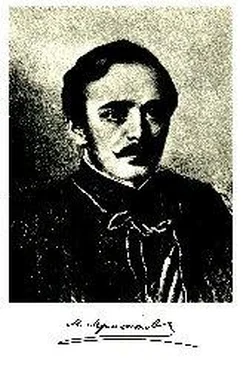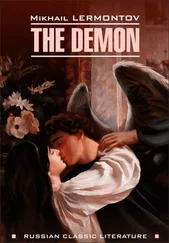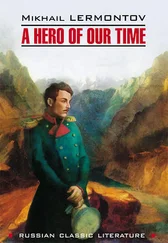"That evening Kazbich was gloomier than I had ever seen him, and I noticed that he had a coat of mail under his shirt. 'There must be a reason for the armor,' thought I. 'He is evidently plotting [41] planning what? The plot is thin here.
something.'
"It was stuffy indoors, so I stepped out into the fresh air. The night was settling on the hills and the mist was beginning to weave in and out among the gorges.
"It occurred to me to look into the shelter where our horses stood and see whether they were being fed, and besides, caution never hurt anything. After all, I had a fine horse and a good many Kabardians had cast fond glances at him and said: ' Yakshi tkhe, chek yakshi !' [Good horse, excellent!]
"I was picking my way along the fence when suddenly I heard voices. One of the speakers I recognized right away: it was that good-for-nothing Azamat, our host's son. The other spoke more slowly and quietly. 'I wonder what they're up to,' thought I. 'I hope it's not about my horse.' I dropped down behind the fence and cocked my ears, trying not to miss a word. It was impossible to hear everything, for now and then the singing and the hum of voices from the hut drowned out the conversation I was so interested to hear.
"'That's a fine horse you have,' Azamat was saying. 'Were I the master of my house and the owner of a herd of three hundred mares, I'd give half of them for your horse, Kazbich!'
"'So it's Kazbich,' I thought and remembered the coat of mail.
"'You're right,' Kazbich replied after a momentary silence, 'you won't find another like him in all Kabarda. Once, beyond the Terek it was, I rode with the guerrillas [22] Parker's word is "ruffians", Nabokov's is "cut-throats." It indicates the resentment of the regular army officer against the unconventional but effective tactics of the mountain guerrillas, a word we sometimes use for Parker's abreks .
to pick up some Russian horses. We were unlucky though, and had to scatter. Four Cossacks [42] southern Russian tribesmen, Christians, who served as skilled cavalrymen and sort of military police force.
came after me-I could already hear the infidels [43] word used is actually "Giaour," Turkish for non-Muslim, like the Yiddish "goy."
shouting behind me, and ahead of me was a thicket. I bent low in the saddle, trusted myself to Allah and for the first time in my life insulted the horse by striking him. Like a bird he flew between the branches, the thorns tore my clothes, and the dry elm twigs lashed my face. The horse leapt over tree stumps and crashed through the brush. It would have been better for me to slip off him in some glade and take cover in the woods on foot, but I couldn't bear to part with him, so I held on, and the Prophet rewarded me. Some bullets whistled past overhead! I could hear the Cossacks, now dismounted, running along on my trail... Suddenly a deep gully opened up in front-my horse hesitated for a moment, and then jumped. But on the other side his hind legs slipped off the sheer edge and he was left holding on by the forelegs. I dropped the reins and slipped into the gully. This saved the horse, who managed to pull himself up. The Cossacks saw all this, but none of them came down into the ravine to look for me-they probably gave me up for dead. Then I heard them going after my horse. My heart bled as I crawled through the thick grass of the gully until I was out of the woods. Now I saw some Cossacks riding out from the thicket into the open and my Karagyoz [44] Nabokov believes it means "Black Eye" in Turkic, but again, the Circassians here didn't speak a Turkic language. The love affair between Russian men and their horses is described in many books.
galloping straight at them. With a shout they made a dash for him. They chased him for a long time. One of them almost got a lasso around his neck once or twice-I trembled, turned away and began praying. Looking up a few moments later I saw my Karagyoz flying free as the wind, his tail streaming while the infidels trailed far behind in the plain on their exhausted horses. I swear by Allah this is the truth, the truest truth! I sat in my gully until far into the night. And what do you think happened, Azamat? Suddenly through the darkness I heard a horse running along the edge of the gully, snorting, neighing and stamping his hoofs-I recognized the voice of my Karagyoz, for it was he, my comrade! Since then we have never separated.'
"You could hear the man patting the smooth neck of the horse and whispering to him all kinds of pet names.
"'Had I a herd of a thousand mares,' said Azamat, 'I would give it to you for your Karagyoz.'
"' Iok , No, I wouldn't take it,' replied Kazbich indifferently.
"'Listen, Kazbich,' Azamat coaxed him. 'You are a good man and a brave warrior; my father fears the Russians and doesn't let me go into the mountains. Give me your horse and I'll do anything you want, I'll steal for you my father's best musket or sword, whatever you wish-and his saber is a real Gurda [45] famous sword-maker made very sharp blades layered and tempered like Toledo steel. Pistols and muskets of the time had only a short range and were inaccurate from a moving horse. Swords and knives were important emblems for men.
. Lay the blade against your hand and it will cut deep into the flesh. Mail like yours won't stop it.'
"Kazbich was silent.
"'When I first saw your horse,' Azamat went on, 'prancing under you, his nostrils open wide and sparks flying under his hoofs, something strange happened in my soul, and I lost interest in everything. I have nothing but contempt now for my father's best horses, I'm ashamed to be seen riding them, and I have been sick at heart. In my misery I've spent days on end sitting on a hill, thinking of nothing but your fleet-footed Karagyoz with his proud stride and sleek back as straight as an arrow, his blazing eyes looking into mine as if he wanted to speak to me. I'll die, Kazbich, if you will not sell him to me,' said Azamat in a trembling voice.
"I thought I heard him sob; and I must tell you that Azamat was a most stubborn lad and even when he was younger nothing could ever make him cry.
"In reply to his tears I heard something like a laugh.
"'Listen!' said Azamat, his voice firm now. 'You see I am ready to do anything. I could steal my sister for you if you want. How she can dance and sing! And her gold embroidery is something wonderful! The Turkish Padishah himself never had a wife like her. If you want her, wait for me tomorrow night in the gorge where the stream flows. I'll go by with her on the way to the next village-and she'll be yours. Isn't Bela worth your steed?'
"For a long, long time Kazbich was silent. At last instead of replying, he began softly singing an old song:
'Many fair maids in this village of mine,
Their eyes are dark pools where the stars seem to shine.
Sweet flits the time making love to a maid,
Sweeter's the freedom of any young blade.
Wives by the dozen are purchased with gold,
But a spirited steed is worth riches untold;
Swift o'er the plains like a whirlwind he flies,
Never betrays you, and never tells lies.'
note: [46] probably invented by Lermontov, and his lie about its being in prose first is just piling fiction upon preposterous fiction. Lermontov wrote surpassingly good verse still memorized by Russians, but pretty much unknown in English. Author's note : I apologize to my readers for having put Kazbich's song, which of course was told in prose, into verse; but habit is second nature.
"In vain Azamat pleaded with him; he tried tears, flattery, and profanity, until finally Kazbich lost patience with him: 'Get away with you, boy! Are you crazy? You could never ride my horse! He'd throw you after the first three paces and you'd smash your head against a rock.'
Читать дальше

![Михаил Лермонтов - A Hero of Our Time [New Translation]](/books/27671/mihail-lermontov-a-hero-of-our-time-new-translati-thumb.webp)










